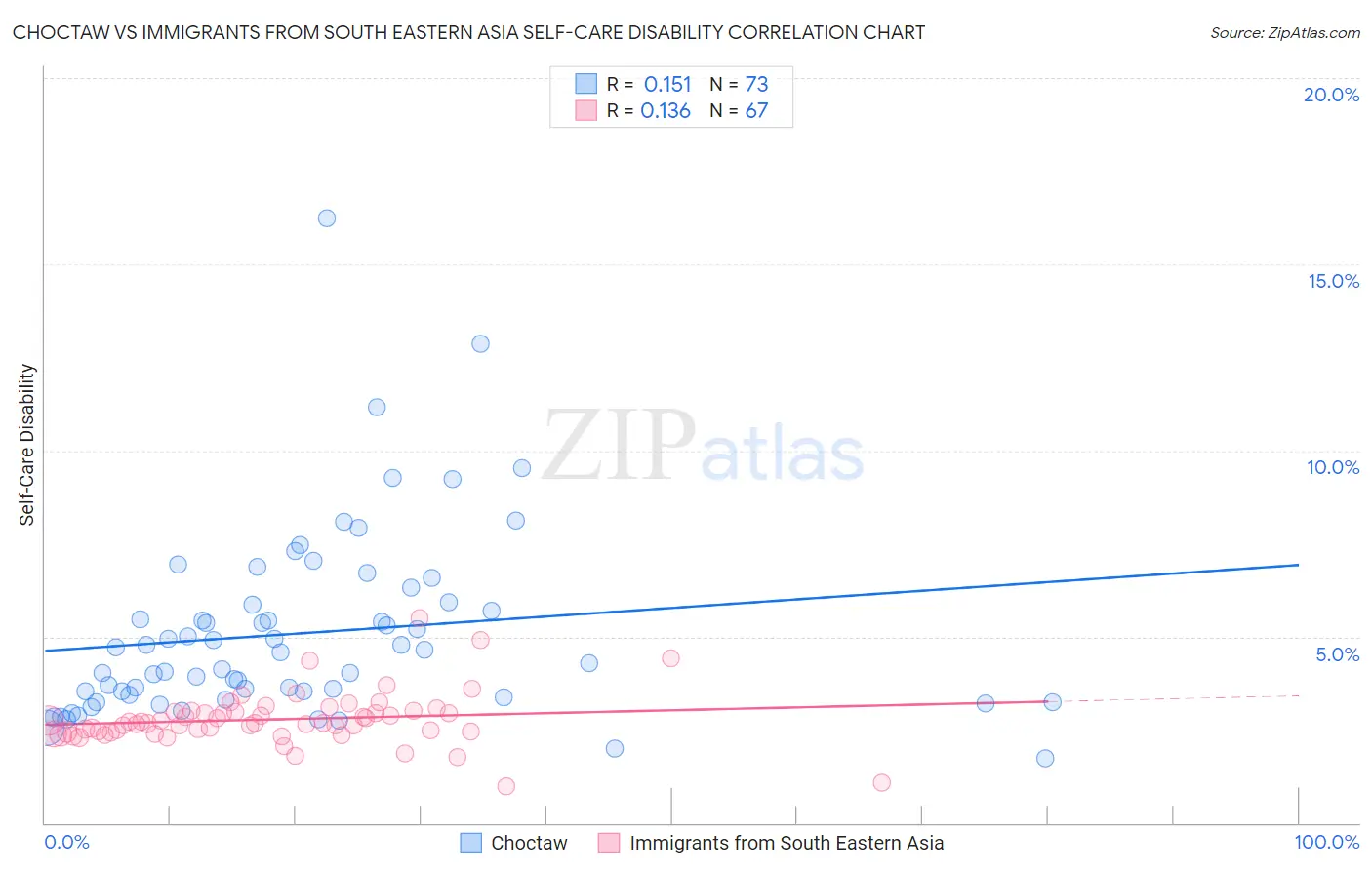Choctaw vs Immigrants from South Eastern Asia Self-Care Disability
COMPARE
Choctaw
Immigrants from South Eastern Asia
Self-Care Disability
Self-Care Disability Comparison
Choctaw
Immigrants from South Eastern Asia
3.0%
SELF-CARE DISABILITY
0.0/ 100
METRIC RATING
337th/ 347
METRIC RANK
2.5%
SELF-CARE DISABILITY
12.9/ 100
METRIC RATING
201st/ 347
METRIC RANK
Choctaw vs Immigrants from South Eastern Asia Self-Care Disability Correlation Chart
The statistical analysis conducted on geographies consisting of 269,470,857 people shows a poor positive correlation between the proportion of Choctaw and percentage of population with self-care disability in the United States with a correlation coefficient (R) of 0.151 and weighted average of 3.0%. Similarly, the statistical analysis conducted on geographies consisting of 511,565,632 people shows a poor positive correlation between the proportion of Immigrants from South Eastern Asia and percentage of population with self-care disability in the United States with a correlation coefficient (R) of 0.136 and weighted average of 2.5%, a difference of 19.9%.

Self-Care Disability Correlation Summary
| Measurement | Choctaw | Immigrants from South Eastern Asia |
| Minimum | 1.7% | 0.99% |
| Maximum | 16.2% | 5.5% |
| Range | 14.5% | 4.5% |
| Mean | 5.1% | 2.8% |
| Median | 4.6% | 2.7% |
| Interquartile 25% (IQ1) | 3.4% | 2.4% |
| Interquartile 75% (IQ3) | 5.9% | 3.0% |
| Interquartile Range (IQR) | 2.5% | 0.54% |
| Standard Deviation (Sample) | 2.5% | 0.71% |
| Standard Deviation (Population) | 2.5% | 0.70% |
Similar Demographics by Self-Care Disability
Demographics Similar to Choctaw by Self-Care Disability
In terms of self-care disability, the demographic groups most similar to Choctaw are Cape Verdean (3.0%, a difference of 0.31%), Immigrants from Dominican Republic (3.0%, a difference of 0.69%), Immigrants from Cabo Verde (3.1%, a difference of 1.0%), Immigrants from Yemen (3.0%, a difference of 1.1%), and Immigrants from the Azores (3.0%, a difference of 1.2%).
| Demographics | Rating | Rank | Self-Care Disability |
| Nepalese | 0.0 /100 | #330 | Tragic 3.0% |
| Lumbee | 0.0 /100 | #331 | Tragic 3.0% |
| Kiowa | 0.0 /100 | #332 | Tragic 3.0% |
| Dutch West Indians | 0.0 /100 | #333 | Tragic 3.0% |
| Houma | 0.0 /100 | #334 | Tragic 3.0% |
| Immigrants | Azores | 0.0 /100 | #335 | Tragic 3.0% |
| Immigrants | Yemen | 0.0 /100 | #336 | Tragic 3.0% |
| Choctaw | 0.0 /100 | #337 | Tragic 3.0% |
| Cape Verdeans | 0.0 /100 | #338 | Tragic 3.0% |
| Immigrants | Dominican Republic | 0.0 /100 | #339 | Tragic 3.0% |
| Immigrants | Cabo Verde | 0.0 /100 | #340 | Tragic 3.1% |
| Dominicans | 0.0 /100 | #341 | Tragic 3.1% |
| Colville | 0.0 /100 | #342 | Tragic 3.1% |
| Tohono O'odham | 0.0 /100 | #343 | Tragic 3.1% |
| Pueblo | 0.0 /100 | #344 | Tragic 3.3% |
Demographics Similar to Immigrants from South Eastern Asia by Self-Care Disability
In terms of self-care disability, the demographic groups most similar to Immigrants from South Eastern Asia are Immigrants from Western Africa (2.5%, a difference of 0.030%), Slovak (2.5%, a difference of 0.030%), Immigrants from Lebanon (2.5%, a difference of 0.050%), Immigrants from Bahamas (2.5%, a difference of 0.11%), and Immigrants from Ghana (2.5%, a difference of 0.18%).
| Demographics | Rating | Rank | Self-Care Disability |
| Immigrants | Germany | 17.9 /100 | #194 | Poor 2.5% |
| Immigrants | Southern Europe | 15.6 /100 | #195 | Poor 2.5% |
| Koreans | 15.5 /100 | #196 | Poor 2.5% |
| Crow | 15.2 /100 | #197 | Poor 2.5% |
| Immigrants | Immigrants | 15.0 /100 | #198 | Poor 2.5% |
| Immigrants | Ghana | 14.7 /100 | #199 | Poor 2.5% |
| Immigrants | Western Africa | 13.3 /100 | #200 | Poor 2.5% |
| Immigrants | South Eastern Asia | 12.9 /100 | #201 | Poor 2.5% |
| Slovaks | 12.6 /100 | #202 | Poor 2.5% |
| Immigrants | Lebanon | 12.4 /100 | #203 | Poor 2.5% |
| Immigrants | Bahamas | 11.9 /100 | #204 | Poor 2.5% |
| Immigrants | Russia | 11.0 /100 | #205 | Poor 2.5% |
| Alaskan Athabascans | 10.4 /100 | #206 | Poor 2.5% |
| French | 9.9 /100 | #207 | Tragic 2.5% |
| Central Americans | 8.7 /100 | #208 | Tragic 2.5% |